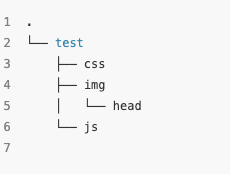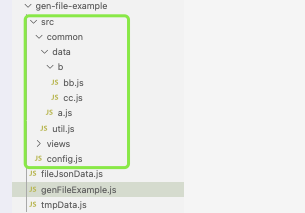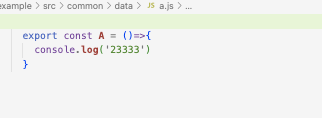1.0.5 • Published 2 years ago
fs-json-to-files v1.0.5
fs-json-to-files
use it, you can create you project folders by folder json data, width any you template content;
Installation
npm install fs-json-to-filesimport it to your work root, if you create a project,if you need to create many files or folders, it can help you,
at least, i think it
More specifically,this is a tool, generate your project folders,keep you folder structure, fill template content your configured;
i search in the web,many content about folders generate text tree, like:
tree;then it give me a snippet 
every time i build a new project, many folders、files require to create, need to fill content,
if tree has reverse operation,it will be great;
i search in the web, Almost no discovery of this feature;npm 、github 、or Blog、Forum;
so i did it , It took half a day , then It took another half day to publish。
usage:
// example.js
import { genFilesByJsonData } from "fs-json-to-files";
import { temps } from "./tmpData.js";
import { fileJsonData } from "./fileJsonData.js";
// options?{ basePath}, default is your current folder,if need,you can config it with options.basePath
genFilesByJsonData(temps, fileJsonData,options?);
// You can use it when creating projects, updating requirements,
// and planning to create multiple file structures,
// instead of manually generating them one by one

his directory will be the current directory where your node command is executed
node example.jsthe fileJsonData example:
// fileJsonData.js
// I prefer to use this data structure here,
// which is a one-to-one mapping of file structures without sub arrays such as children
// each Object will renerate one folder, the inner Object is also,done and done,
// if the value of key is type of string, it will be defined as a file,it can be followed a '-' ,
// the later is content template type that will fill.if no,the file will a empty file, no bad impact.
export const fileJsonData = {
src: {
views: {
app: "app.vue-tempVue",
},
config: "config.js-tempA",
common: {
util: "util.js-tempA",
data: {
a: "a.js-tempA",
b: {
bb: "bb.js-tempB",
cc: "cc.js-tempB",
},
},
},
},
};the temps example:
// tmpData.js
// I have chosen to put the template type in a separate file, corresponding to the template in the JSON data file just now
export const temps = {
tempVue: `
<template>
<div></div>
</template>
<script setup>
</script>
<style lang="less">
</style>
`,
tempA: `
export const A = ()=>{
console.log('23333')
}
`,
tempB: `
export const B = ()=>{
console.log('b3333')
}
`,
};